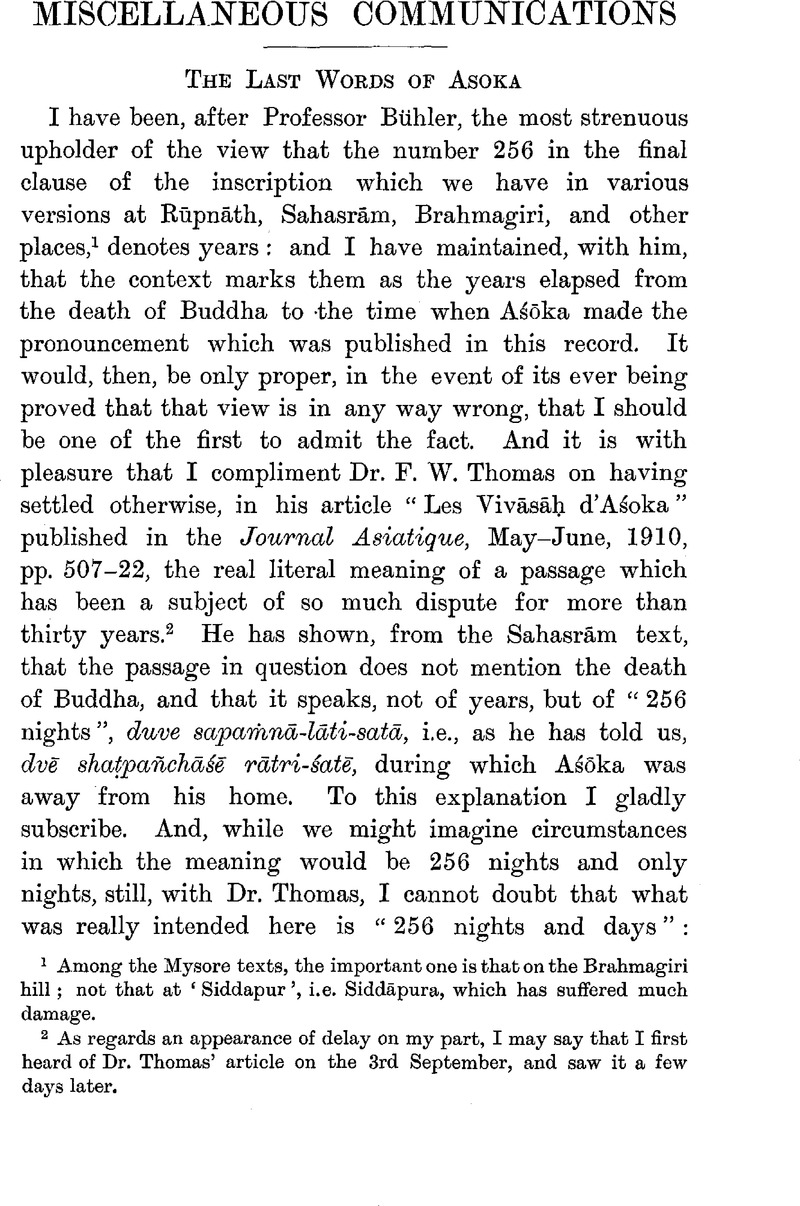No CrossRef data available.
Article contents
Abstract

- Type
- Miscellaneous Communications
- Information
- Copyright
- Copyright © The Royal Asiatic Society 1910
References
Page 1301 note 1 Among the Mysore texts, the important one is that on the Brahmagiri hill; not that at ‘Siddapur’, i.e. Siddāpura, which has suffered much damage.
Page 1301 note 2 As regards an appearance of delay on my part, I may say that I first heard of Dr. Thomas' article on the 3rd September, and saw it a few days later.
Page 1303 note 1 For my identification of this hill, and regarding its position, see this Journal, 1909. 998. We can perhaps point to the actual abode, subsequently appropriated by the Jains as a cave-temple, in which Aśōka ended his days: see this Journal, 1908. 498.
Page 1303 note 2 See this Journal, 1909. 1015 f.
Page 1303 note 3 I use the word ‘day’ in its customary sense of the civil day, the entire day composed of the daytime and the night.
Page 1303 note 4 S'en aller de chez soi, loc. cit., p. 516. line 16: vivre autre part, ibid., line 4 from the bottom: vivre dans l'isolement, ibid., last line: demeurer autre part, p. 517, line 14.
Page 1304 note 1 Être en voyage; s'en aller faire un tour; p. 518, lines 1, 2.
Page 1304 note 2 See this Journal, 1908. 819. A continuous period of eight and a half months must include either the hot weather or the rains, or parts of both of them.
Page 1304 note 3 Loc. cit., p. 515:—‘In the present state of our Sanskrit and Pali studies, it seems no longer sufficient to “take” a word in such or such a meaning: what is wanted is to find them used in those meanings.’
Page 1304 note 4 On the expression vachanēna, ‘by a speech of, by the words of, in the name of (so-and-so)’, see, fully, this Journal, 1909. 996.
Page 1305 note 1 Loc. cit., pp. 517–8.
Page 1305 note 2 The Rūpnāth text has kaṭe, ‘made’: the Brahmagiri text has sāv[ā]p[i]te, ‘caused to be heard’. The Sahasrām text omits one or the other of these words.
Page 1305 note 3 The question whether this clause was uttered by Aśōka or was added by the officials, is not of any vital importance. But the absence here and in the other texts of the word mayā, ‘by me’, points strongly in the direction that the clause is not a part of Aśōka's address.
Page 1306 note 1 We are perhaps accustomed to associate the idea of brahmacharya specially with Brāhmaṇ boys or youths, living in the house of a religious teacher, studying the scriptures, and observing chastity. But the Buddhists recognized a brahmacharya, practised in solitude, of adult members of their order. The term is found freely in at any rate the Suttanipāta, where Professor Fausböll has translated it sometimes by “juvenile chastity”, sometimes by “chastity, a chaste life”, but usually by “a religious life”. And for a very clear definition of the sense in which it was used by the Buddhists, showing exactly what it connoted to them, I may cite a passage at the end (text, p. 15) of another division of the same work, the Kasibhãradvajāsutta, quoting the words of Professor Fausböll's translation in SBE, 10. 14 f.:—“Then the Brāhmaṇa Kasibhāradvāja [a new convert just made by Buddha] received the pabbajjā from Bhagavat, and he received also the upasampadā; and the venerable Bhāradvāja having lately received the upasampadā, leading a solitary, retired, strenuous, ardent, energetic life, lived after having in a short time in this existence by his own understanding ascertained and possessed himself of that highest perfection of a religious life [brahmachariya-pariyōsānarṭ] for the sake of which men of good family rightly wander away from their houses to a houseless state. ‘Birth had been destroyed, a religious life had been led [vusitarṭ brahmachariyaṭ], what was to be done had been done, there was nothing else (to be done) for this existence,’ so he perceived, and the venerable Bhāradvāja became one of the arahats (saints).”
Page 1307 note 1 For another literary instance, that of the kings of Allakappa and Veṭhadīpa, see Buddhaghōsha in the place mentioned by me in this Journal, 1906. 899, note 2. So also Bhaddiya, a king of the Sakyas in the time of Buddha, renounced the world: Vinayapiṭaka, Chullavagga, 7. 1. 3, 4. From Jain literature we may note the statements about Saṁjaya and various other rulers: SBE, 45. 85–7. The literary instances are, no doubt, in many cases imaginative: but they help to prove the prevalence of the custom.
Page 1307 note 2 See my table in this Journal, 1909. 27.
Page 1307 note 3 See this Journal, 1908. 485, 497.




